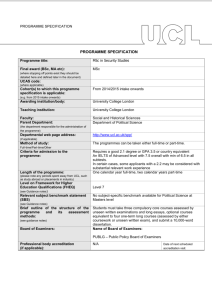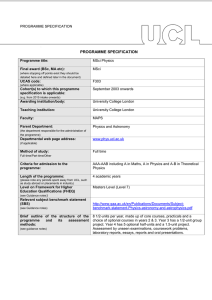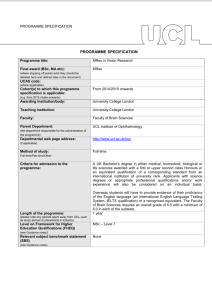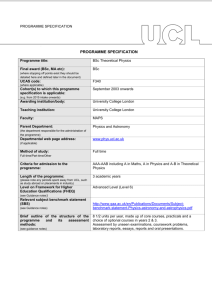PROGRAMME SPECIFICATION Executive MPA: Global Public Policy and Management MPA
advertisement
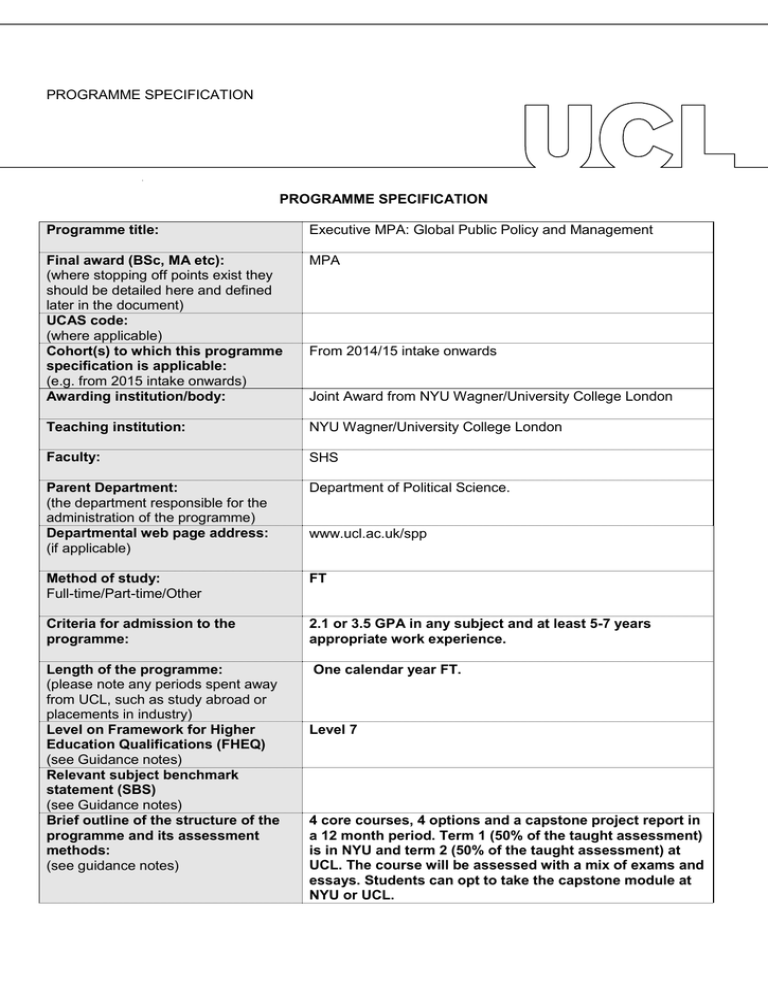
PROGRAMME SPECIFICATION PROGRAMME SPECIFICATION Programme title: Executive MPA: Global Public Policy and Management Final award (BSc, MA etc): (where stopping off points exist they should be detailed here and defined later in the document) UCAS code: (where applicable) Cohort(s) to which this programme specification is applicable: (e.g. from 2015 intake onwards) Awarding institution/body: MPA Teaching institution: NYU Wagner/University College London Faculty: SHS Parent Department: (the department responsible for the administration of the programme) Departmental web page address: (if applicable) Department of Political Science. Method of study: Full-time/Part-time/Other FT Criteria for admission to the programme: 2.1 or 3.5 GPA in any subject and at least 5-7 years appropriate work experience. Length of the programme: (please note any periods spent away from UCL, such as study abroad or placements in industry) Level on Framework for Higher Education Qualifications (FHEQ) (see Guidance notes) Relevant subject benchmark statement (SBS) (see Guidance notes) Brief outline of the structure of the programme and its assessment methods: (see guidance notes) One calendar year FT. From 2014/15 intake onwards Joint Award from NYU Wagner/University College London www.ucl.ac.uk/spp Level 7 4 core courses, 4 options and a capstone project report in a 12 month period. Term 1 (50% of the taught assessment) is in NYU and term 2 (50% of the taught assessment) at UCL. The course will be assessed with a mix of exams and essays. Students can opt to take the capstone module at NYU or UCL. Board of Examiners: Name of Board of Examiners: MPA Board of Examiners Professional body accreditation (if applicable): NA Date of next scheduled accreditation visit: EDUCATIONAL AIMS OF THE PROGRAMME: The EMPA-GPPM is intended to serve experienced public service professionals—analysts, decision makers and managers—who wish to refresh their knowledge base and to reinvent how they approach their work. The programme provides core courses that bridge cutting edge concepts, topics and skills in policy analysis, management, implementation, and facilitating change. Students in the programme, depending on their needs and interests, can then take advantage of the offerings of both the UCL School of Public Policy and the NYU Wagner School to craft a specific approach that best positions them to meet their personal educational and professional goals. PROGRAMME OUTCOMES: The programme provides opportunities for students to develop and demonstrate knowledge and understanding, qualities, skills and other attributes in the following areas: A: Knowledge and understanding Knowledge and understanding of: 1. The theoretical approaches and debates in Public Policy— especially the relationship between national and internal authories, theories of policy-making and new public management, Policy Implementation, and organisational change. 2. The analysis of concepts such as Agenda-setting, Cost benefit Analysis, Policy Evaluation, Policy Delivery Choices and Program performance. Teaching/learning methods and strategies: Acquisition of 1 through one-hour or two-hour lectures and seminars. Several courses, especially the core required courses in Global Public Policy Analysis Reform, Institutions, Governance and Public Sector Reform, Policy Implementation and Managing Organisational Change, and the advance professional project for an international organisation in public policy. Acquisition of 2, 3, 4, and 5 through the above mentioned required and optional courses, which give students the opportunity to specialise in either empirical or normative dimensions of the issue of international public policy. 3. Empirical and normative arguments and models of the proliferation of various forms of political violence, drawing upon theoretical literatures from across the sub-disciplines of Public Policy, Economics and Political Science, as well as Management and Planning. 4. How domestic, transnational, and international forms of public Policy can me managed. Toward this end, attention is also placed upon the role of international institutions, decision-making frameworks, pluralistic political systems, and social movements in the international system. Skills for the analytical study of politics, political actors, preferences and objectives, the role of institutions and strategic behaviour, hypothesis testing and empirical analysis. Assessment: Students will be assessed by a variety of methods: ‘unseen’ examinations, essays and a a capstone group project. The last mentioned is a required method of assessment. B: Skills and other attributes Intellectual (thinking) skills: The programme aims to help students: 1. approach public policy in a rigorous, systematic, and theoretically-informed way, and to question the premises of much contemporary domestically focused public policy literature and political analysis. Teaching/learning methods and strategies: Acquisition of 1 and 2 is fostered in all courses offered in the Programme. Students will confront the main theories in public policy, economics and political science and will be invited to question their premises and to assess the empirical validity of their hypotheses. 2. collect and use empirical evidence in a selective and systematic way, and to question the explanatory power and reassess the validity of the most authoritative works in public policy, political science, and particularly in Globalisation debates. Assessment: Students will be assessed by a variety of methods: ‘unseen’ examinations, long essays, and a dissertation. The latter is a required method of assessment. C: Skills and other attributes Practical skills (able to): This programme aims to provide the students with the following practical skills: 1. communicate effectively in writing 2. improve their knowledge of Public Policy and international politics, and policies across a range of issue areas 3. improve their knowledge of the politics of historical and contemporary cases of Global public policy and policy-making in a international environment. 4. use data-bases, digital and web resources, word-processing programmes, and statistical packages 5. present (non-assessed) seminar papers 6. listen, discuss and debate ideas, interpretations and evidence introduced during seminars 7. practice research and data collection of documents of governments and non-state actors 8. maintain a constant rhythm of learning and research 9. choose their own long-essay and dissertation topics 10. develop a research strategy and project work 11. learn a method for hypothesis testing 12. adapt the working hypotheses developed in the long essay and dissertation in light of the empirical evidence and its interpretation Teaching/learning methods and strategies: 1) through the writing of long essays and dissertations 2-3) through weekly lectures 4) though instructions in seminars 5) through regular seminar presentations 6) through seminar discussion 7) through visits to the British Library 8) through individual discussions with staff and students 9-12) through the production of long essays and dissertation Skills will be taught in both required and optional courses. They will be taught by scholars that have subject-specific knowledge and have carried out theoretical and empirical research in the field. The classes will also provide general instructions on research design and practical; instructions on data sources, collection, and analysis. Assessment: 1-4) and 7-12) through ‘unseen’ examinations, long essays, and dissertation. The latter is a required method of assessment. D: Skills and other attributes Transferable skills (able to): Transferable skills (able to): The programme will encourage students to: 1. write good essays and dissertations 2. improve their knowledge of International governance in general and of public policy in particular 3. use computer resources and information technology 4. present (non-assessed) material orally 5. listen and contribute in class 6. understand and assess contending ideas and arguments 7. study a variety of written and digital materials available from libraries 8. familiarise with documents of governments and non-state actors 9. reflect on their own normative ideas by becoming acquainted with alternative points of view 10. make original contributions to the study of International Governance and public policy 11. understand and assess critically empirical evidence and develop methods to test predictions 12. think both positively and normatively about public policy issues Teaching/learning methods and strategies: 1-3, 7-12) through long essays, course readings, and Project work 2) reading academic works on Public Policy, politics, international relations, and Economics. 3) submitting word-processed written work, using databases, consulting online library catalogues, using web-site material and field projects. 4-12) seminar presentations and discussion Assessment: 1-3, 7-12) through ‘unseen’ examinations, long essays, and dissertation. The latter is a required method of assessment. The following reference points were used in designing the programme: the Framework for Higher Education Qualifications: (http://www.qaa.ac.uk/en/Publications/Documents/qualifications-frameworks.pdf); the relevant Subject Benchmark Statements: (http://www.qaa.ac.uk/assuring-standards-and-quality/the-quality-code/subject-benchmarkstatements); the programme specifications for UCL degree programmes in relevant subjects (where applicable); UCL teaching and learning policies; staff research. Please note: This specification provides a concise summary of the main features of the programme and the learning outcomes that a typical student might reasonably be expected to achieve and demonstrate if he/she takes full advantage of the learning opportunities that are provided. More detailed information on the learning outcomes, content and teaching, learning and assessment methods of each course unit/module can be found in the departmental course handbook. The accuracy of the information contained in this document is reviewed annually by UCL and may be checked by the Quality Assurance Agency. Programme Organiser(s) Name(s): Date of Production: Professor Albert Weale Date of Review: December 2014 Date approved by Head of Department: Date approved by Chair of Departmental Teaching Committee: Date approved by Faculty Teaching Committee December 2014 May 2014 December 2014 January 2015
